Niacinamide, also known as vitamin B3, is a skincare ingredient that has been shown to be effective in the treatment of many skin conditions, including acne.
Additionally, it’s also used as an anti-aging ingredient because it can help minimize wrinkles and brighten your complexion.
But besides being so popular, there are still some questions about how exactly it works, and more importantly – how to use it for best results?
In this article, I’m answering 30 frequently asked questions about niacinamide.
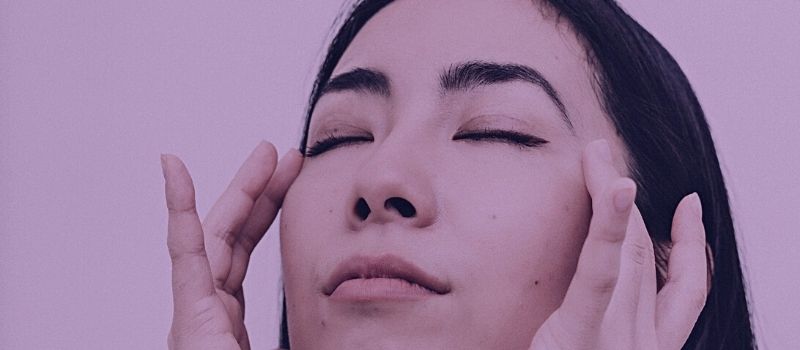
What is Niacinamide?
Niacinamide, also known as vitamin B3, is an ingredient found in skincare products.
It has anti-inflammatory properties and can help even out uneven skin tone, reduce discoloration, fade hyperpigmentation, balance out oil production, reduce acne, and soothe redness.
Can Niacinamide be Used in The Morning?
Niacinamide can be a great ingredient in your morning skincare routine due to its ability to strengthen the skin barrier and protect the skin from UV damage.
That said, niacinamide isn’t a replacement for sunscreen, so you should always finish your morning routine with high SPF.
How can You Increase the Effectiveness of Niacinamide?
There are a few things you can do to increase the effectiveness of niacinamide, including:
- Using niacinamide alongside other anti-aging ingredients such as retinol.
- Using niacinamide alongside other anti-acne ingredients such as salicylic acid or benzoyl peroxide.
- Using niacinamide on damp skin.
- Using an adequate percentage of niacinamide (5-10%)
- Applying a lightweight, hydrating moisturizer after a niacinamide serum to strengthen the skin barrier even more.
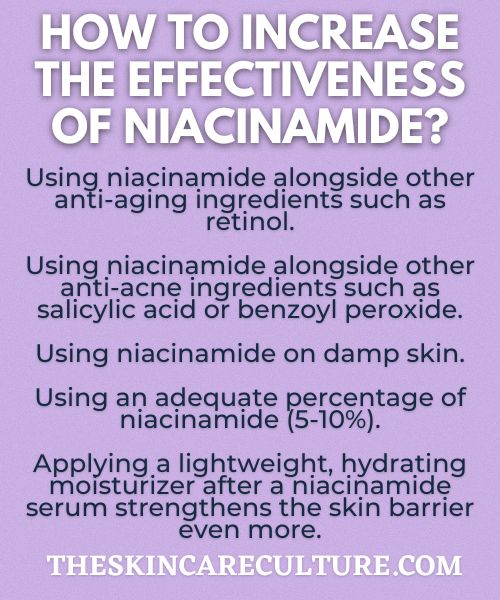
Can I Use Niacinamide with Salicylic Acid?
Niacinamide and salicylic acid can be used both in the same product or one after another, and this can be a great combo to balance excess oiliness, keep the pores clear, minimize blackheads, refine skin texture, soothe inflammation, and get rid of acne.
Do I Need to Use Niacinamide with Vitamin C?
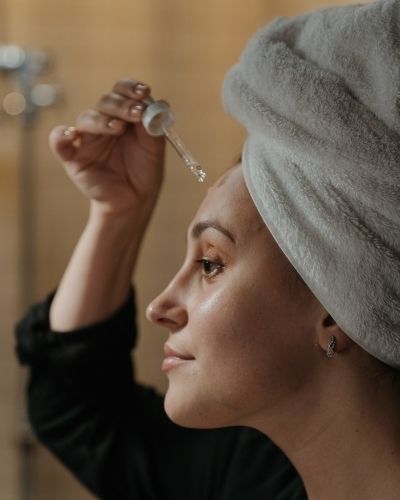
No, you don’t need to use these two ingredients together. But they are frequently combined because niacinamide has antioxidant properties that work really well with vitamin C to protect the skin from sun damage.
Additionally, vitamin C and niacinamide can repair discoloration caused by UV rays, hyperpigmentation, uneven skin tone, and rough skin texture.
Can Niacinamide be Used With Tretinoin?
Yes! Niacinamide and retinoic acid (tretinoin) are frequently used together, and this is a fantastic combo to target anything from hyperpigmentation, discoloration, texture, redness, acne, and prominent signs of aging.
Can Niacinamide be Used Daily?
Niacinamide is a great ingredient for daily use and can even be used twice a day without an issue.
Can Niacinamide Fade Stretch Marks?
Unfortunately, niacinamide cannot fade stretch marks.
Stretch marks are a type of scar that develops when the skin stretches or shrinks quickly, such as during pregnancy or when you lose or gain weight in a short period of time.
The abrupt change causes the collagen and elastin, which are proteins that support the skin, to rupture. As the skin heals, stretch marks may appear.
Currently, the most effective treatment for stretch marks is microneedling.
Can Niacinamide Cause Gout?
No, niacinamide does not cause gout.
Niacinamide is a form of Vitamin B that has been shown to have anti-inflammatory properties and can help reduce acne, but it’s unlikely you will experience any side effects from using this ingredient.
Can You Apply Niacinamide on Wet Skin?
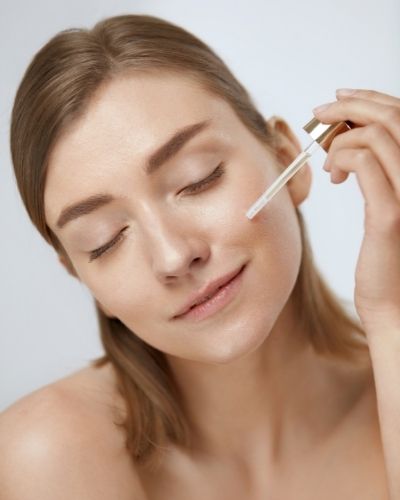
Applying niacinamide on wet skin isn’t a great idea because it can cause the product to evaporate rather than absorb into the skin and deliver its beneficial properties.
It’s best to use niacinamide (and any other skincare product) on damp skin but not soaking wet.
How Can You use Niacinamide for Wrinkles?
Niacinamide can reduce fine lines and wrinkles after prolonged use.
A 12-week clinical study of a topical 5% niacinamide emulsion demonstrated a 21% improvement in fine lines along with a 14% skin tone clarity and 15% radiance improvement.
Therefore, while niacinamide is clearly competent to reduce lines and wrinkles on its own, you should combine it with other anti-aging actives such as vitamin A (retinol) for even better results.
Is Niacinamide Similar to Vitamin A?
Although these two actives work well together to reduce acne, fade hyperpigmentation, and balance out oil production, niacinamide is not similar to vitamin A.
What Does Niacinamide Do?
Niacinamide is not only beneficial for reducing hyperpigmentation and refining out skin texture, but it’s also an effective anti-inflammatory and anti-acne agent.
Niacinamide can help reduce or completely prevent acne in some cases by inhibiting lipids in our sebaceous glands that contribute to acne formation while at the same time increasing ceramides which help the skin maintain optimal hydration levels.
This leads us to one of the most useful properties of niacinamide, which is the ability to improve epidermal barrier function by reducing trans-epidermal water loss and increasing the skin’s resistance to potentially harmful pathogens.
Once your skin barrier is strengthened, your skin will have an easier time dealing with other issues such as redness and sensitivity, but it will also be more resistant to irritation and inflammatory conditions such as acne and rosacea.
Can You Apply Niacinamide Before Makeup?
Yes, you can apply niacinamide before makeup; however, make sure to wait until the product has fully absorbed before applying makeup.
Can You Use Niacinamide With AHAs?
Niacinamide and AHAs are a great combo that can help refine skin texture, fade hyperpigmentation, even out the skin tone, keep the pores clear, and prevent acne breakouts.
Does Niacinamide Expire?
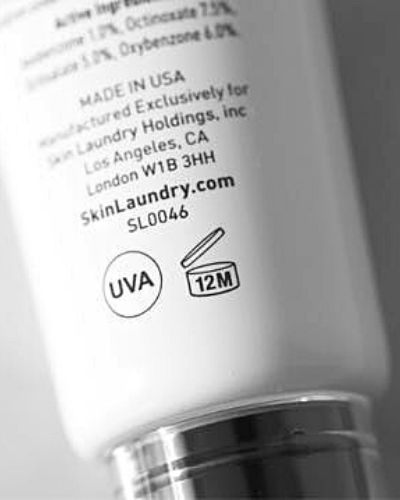
Niacinamide does expire; all cosmetic formulas have expiration dates which are indicated on the packaging by either a number or letter code.
It’s important to check these labels since expired products will likely be less potent and won’t deliver their full effects onto your skin, and can even cause unwanted reactions such as irritation, redness, and peeling.
Additionally, it’s helpful to write a date when you’ve opened the product as this will help you keep track of how long it lasts you and when it’s time to toss it if not used up.
Does Niacinamide Contain Benzoyl Peroxide?
No, niacinamide does not contain benzoyl peroxide as these are two different active ingredients.
However, niacinamide and benzoyl peroxide can be used together to combat acne.
Can Niacinamide be Used on All Skin Types?
Niacinamide is generally well tolerated by all skin types, including sensitive and rosacea-prone skin.
However, it’s been noted that niacinamide can cause sensitivity, especially if used in high concentrations (such as over 10%) or used too frequently.
If niacinamide starts causing your skin to become sensitive and irritated, you should either opt for a lower concentration or use it less frequently.
Does Niacinamide Contain Alcohol?
Some products that contain niacinamide could also contain alcohol, so it’s always best to check the ingredient label if this is something you want to avoid using.
Some alcohols, such as alcohol denat, can be drying to the skin; however, they are often found in skincare products due to their antimicrobial and preservative properties.
Can You Use Niacinamide When Pregnant?
Yes, niacinamide is a pregnancy-safe ingredient; however, make sure that the product you are using doesn’t contain other ingredients that aren’t recommended for pregnancy, such as retinol.
Can You Use Too Much Niacinamide?
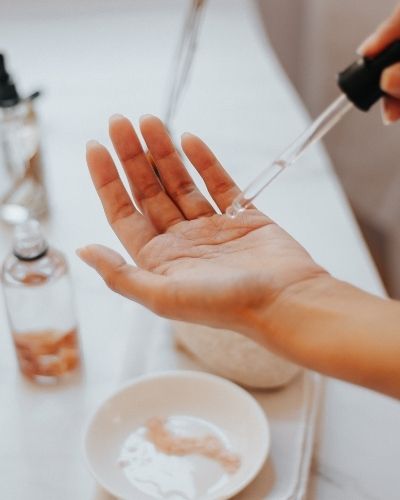
You can certainly overuse niacinamide, and this could lead to sensitivity and irritation.
However, not every skin has the same tolerance, so while someone’s skin might tolerate 20% niacinamide up to twice a day, someone else’s skin might start getting irritated from using as little as 5% niacinamide.
Therefore, it’s always a good idea to do a patch test before applying a new niacinamide product all over your face and to start by using it once every couple of days before you eventually increase your usage to what works best for your skin.
Can You Apply Niacinamide After Dermaplaining & Laser Hair Removal?
While you can apply niacinamide after both dermaplaning and laser hair removal, it’s best to allow your skin to recover without any strong actives.
Therefore, unless your moisturizer contains niacinamide alongside other soothing ingredients, it’s best not to use a targeted niacinamide serum on that day.
Can You Use Niacinamide With Retinoic Acid?
Tretinoin is retinoic acid; therefore, you can definitely use niacinamide alongside this active to help refine skin texture, fade hyperpigmentation, and get rid of acne.
Can You Use Niacinamide With Spironolactone?
Spironolactone is a medication often prescribed to women who are dealing with hormonal acne.
This medication blocks androgens, which are the male hormones that are usually the main culprit of hormonal acne, especially in women.
Therefore, since niacinamide is topically applied, it doesn’t interfere with the action of Spironolactone, so you can use it while taking this medication without an issue.
Does Niacinamide Require A Prescription?
Topical niacinamide products don’t require a prescription and can be found in concentrations from 3% and up to 20%.
Is Niacinamide Safe?
Niacinamide has been used in skincare products for decades, and it’s one of the safest ingredients that you can use on your skin.
Niacinamide is unlikely to cause sensitivity and irritation, and although this can sometimes happen, it usually indicates that the product is not being used properly rather than the ingredient being problematic on its own.
What is Niacinamide Best For?
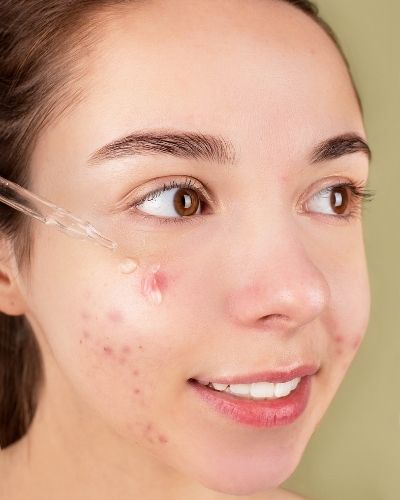
Niacinamide is an anti-inflammatory ingredient that soothes irritation, refines texture, evens out uneven skin tone, brightens the complexion, reduces redness, balances oil production, calms acne, and strengthens the skin barrier.
It’s quite the multitasker, which is why it’s one of the most popular and loved ingredients in skincare products.
Is There a Difference Between Niacin and Niacinamide?
Niacin and niacinamide have an identical function when used as vitamins because both are water-soluble. However, their pharmacologic properties differ.
While niacinamide is usually found in topical formulations and used in skincare, niacin is a vitamin that’s supposed to be taken orally.
Where Can You Get Niacinamide?
You can find niacinamide in a wide range of products, including cleansers, serums, moisturizers, eye creams—pretty much anything you would use on your face.
It’s frequently found in anti-aging products because of its ability to help reduce wrinkles and fine lines, as well as products intended to target acne due to its anti-inflammatory properties.
What Are The Best Niacinamide Products?
Here are some of my favorite niacinamide products:
Good Molecules – 3% Niacinamide Toner – $14
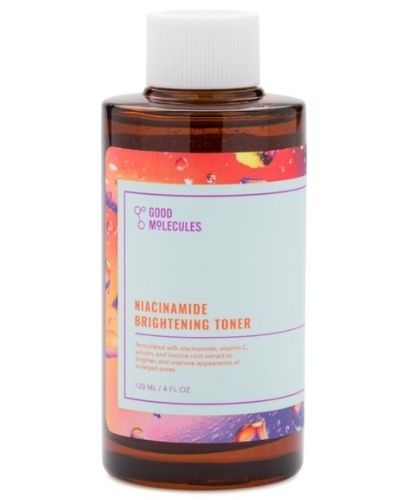
The Good Molecules 3% Niacinamide Toner contains a low concentration of niacinamide, making it most suitable for those with sensitive and reactive skin.
On the other hand, oily folks can also benefit from this toner because it contains super-hydrating but non-clogging ingredients.
Naturium – Niacinamide Serum 12% + Zinc 2% – $16
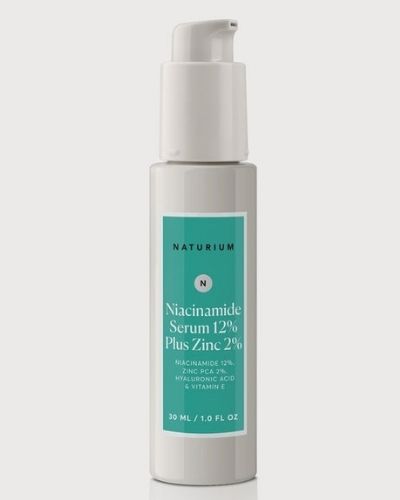
Naturium’s Niacinamide 12% + Zinc 2% is a great product for those who are on the oily, inflammation-prone side and are looking for something that will help refine texture and soothe inflammation.
On the other hand, besides its anti-inflammatory properties, zinc is also a great acne-fighting ingredient.
Paula’s Choice – 10% Niacinamide Booster – $44
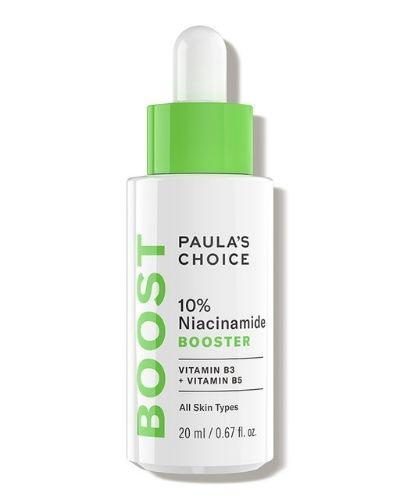
Paula’s Choice 10% Niacinamide Booster has to be the best niacinamide serum I’ve ever tried. It works great for both dry and oily skin, and it’s packed with anti-inflammatory ingredients that help soothe inflammation and calm acne.

My name is Simone and I am a certified skin specialist. I created this website to teach my readers how to take great care of their skin and I also like to occasionally share my honest opinions on skincare products I’ve tried. You can learn more about me here.
